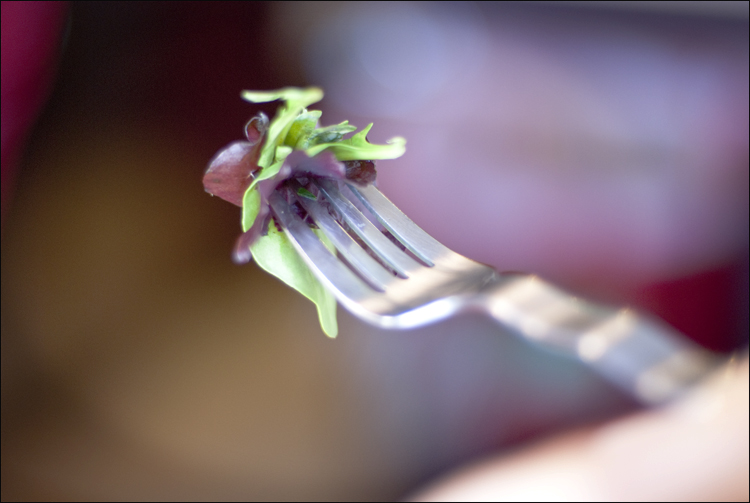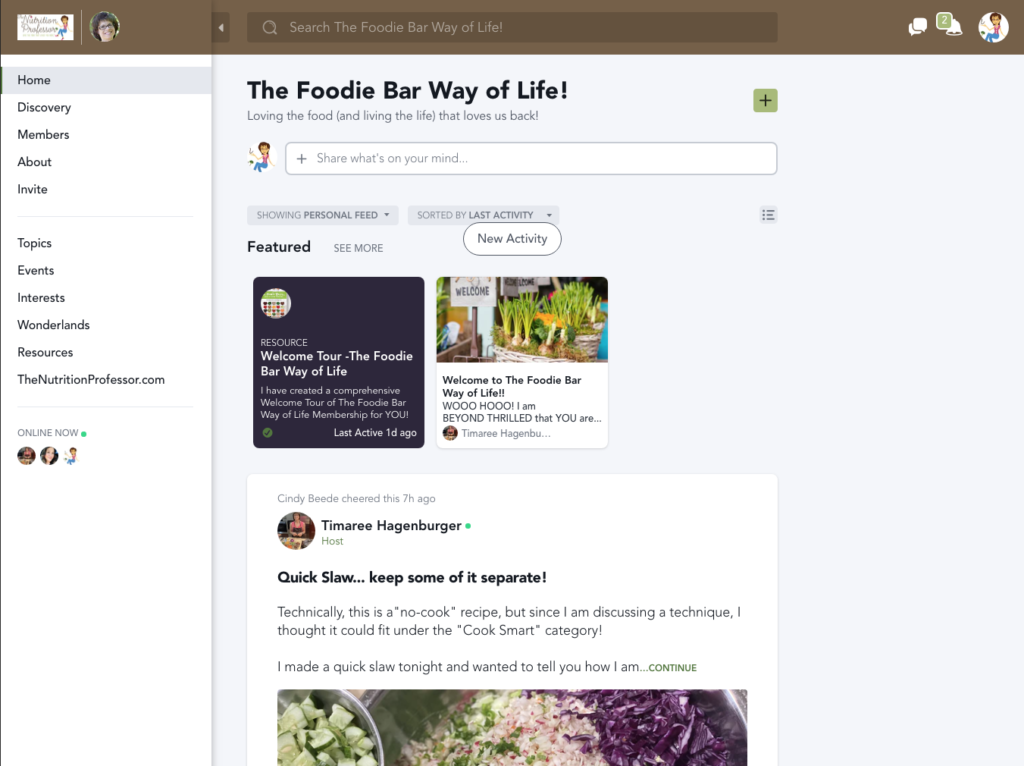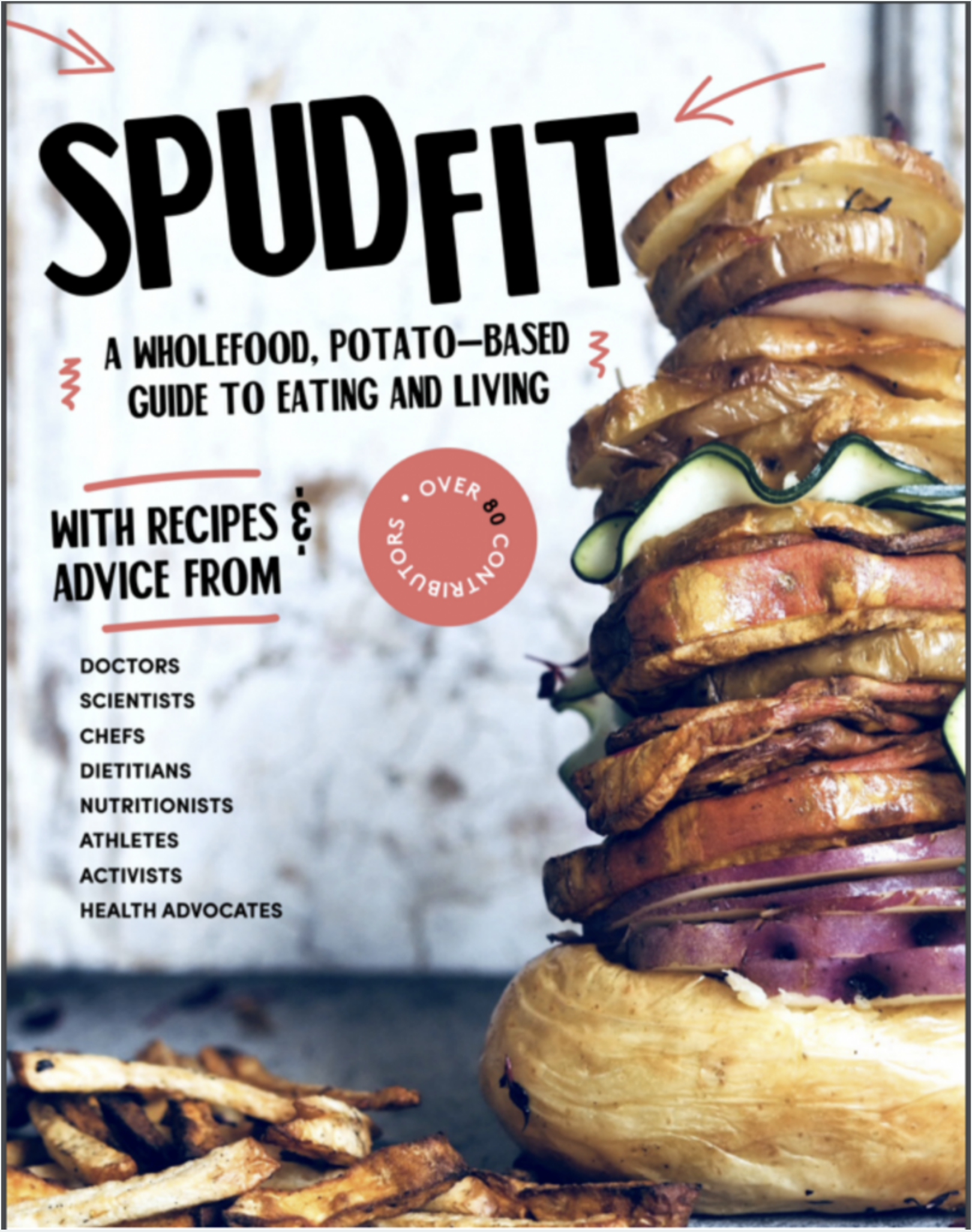I was thrilled to learn that when this article was published in the newspaper, it quickly received national attention, as it was picked up by the Academy of Nutrition and Food and SmartBriefs for Nutritionists !!!
What is a little habit that most people ignore, but could help you get the most nutrition out of the food you choose, while leaving you more satisfied and feeling comfortable after eating? It is something that everyone can do, but most people don’t give it a second thought… chewing!
The amount of health-promoting compounds available to the body can be dramatically increased by chewing your food well. In a study involving broccoli sprouts, the activity level of powerful phytonutrients was much higher in the stomachs of participants who chewed the tiny sprouts as compared to those who swallowed them whole. Breaking down the plant cell walls is also important to allow for some chemistry “magic” to happen! When some plant compounds are given an opportunity to combine, the product can be an amazing cancer fighter (like sulforaphane, which is formed when myrosinase and glucoraphanin from broccoli mix and react, as well as allicin in garlic – formed by the interaction of alliinase and alliin).
Chewing plays a key role in optimal digestion and slowing down a bit can allow the gastrointestinal tract to better coordinate functions. Undigested food is a waste of your money, since nutrients that don’t get broken down will continue traveling through the intestines and right out of the body, without an opportunity to get absorbed into the bloodstream or be able to nourish your cells.
When you take time to chew your food well, communication between the gastrointestinal tract and brain is also optimized, enabling you to experience feelings of satiation, which will allow you to know when to stop eating. Since some of my students nearly inhale their food, without paying any attention to the importance of chewing, and often complain about stuffing themselves, I recently asked them how they knew that they were “done” eating a snack or meal, and then shared some interesting research. When French participants were asked how they knew when to stop eating, the most common replies were, “I am not hungry anymore” and “When the food doesn’t taste good anymore.” When the researchers asked Chicago residents the same question, the top answers were quite different, including, “All of the food is gone,” “The TV show that I am watching is over,” and “Everyone else that I am with is done eating.” Yikes! The French, known at the time for relatively low rates of obesity despite regularly indulging in calorie rich foods, were eating slowly enough to use internal mechanisms to determine their fullness levels before they ate all of the food in front of them. However, the participants in Chicago were completely relying on the external environment to determine how much to eat! Just think about how eating quickly, the explosion of portion sizes and use of DVRs will impact our future waistlines, if we keep eating like this!
So, how do we master the art of chewing? It just takes a little bit of mindful practice, slowing down, so that you don’t end up loading your fork before you are even done swallowing the food already in your mouth! Many of us grew up under pressure to eat quickly, whether from well meaning parents, competing with our siblings or experience in the military. If you are the fastest eater at the table, consider playing a completely different game to slow yourself down: be the last to start and last to finish.
Everyone can benefit from intentionally pausing before ever diving into our food, (consider identifying something for which you are grateful or a saying prayer). This will center you a bit, as well as provide an opportunity to look at your food before you begin eating it, which will trigger your brain to record the amount that is actually there. As you begin eating, it may also be helpful think about eating the amount of food that will enable you to feel great after you finish your meal, since feeling stuffed is uncomfortable and overeating can lead to weight gain. Put down your fork between bites, sip a bit of water in between bites, take smaller bites, or close your eyes and savor the flavor of the foods that you are choosing. If you don’t like the way your food tastes, do something about it! Research shows that when we eat higher quality food with more nutrients, especially plant-based whole foods, we experience a heightened sense of enjoyment. How wonderful will it be to find yourself craving food that actually loves you back?!
A quick note: If you have a family member who relies on dentures, but has experienced a significant change in weight, be sure to check that their dentures still fit. Many elderly people can become malnourished as a consequence of severely limiting their food choices due to poorly fitting dentures and/or difficulty chewing.
Timaree Hagenburger, a registered dietitian, certified exercise physiologist with a master’s degree in public health, is a nutrition professor at Cosumnes River College and sought after speaker. She is so excited about the Plant-Based Nutrition and Sustainable Agriculture certificate program that she and her colleague started there, and also conducts local events, corporate wellness work, has a regular segment on California Bountiful TV, is a frequent podcast guest, and published her innovative and practical cookbook – The Foodie Bar Way: One meal. Lots of options. Everyone’s happy. available at www.FoodieBars.com Find details about Timaree’s upcoming events (cooking demos, book signings and talks about the incredible power you yield with your fork!), and if you missed any of her newspaper columns, podcast interviews or TV appearances, you can find them here at https://www.thenutritionprofessor.com/


 Order and learn more at www.FoodieBars.com
Order and learn more at www.FoodieBars.com

 This is a first for me... Some of MY recipes are part of a rock star compilation cookbook put together by Andrew Spud Fit Taylor!! Order it today!
This is a first for me... Some of MY recipes are part of a rock star compilation cookbook put together by Andrew Spud Fit Taylor!! Order it today!
Way to go on your article being recognized, Prof Hagenburger! It’s nice to know that chewing food is not only a way to be mindful about what we’re eating, but it actually contributes to digestion as well. Double whammy!
Thanks for the marvelous posting! I seriously enjoyed reading it, you’re a great author.
I will be sure to bookmark your blog and will eventually come back later
on. I want to encourage continue your great job,
have a nice weekend!